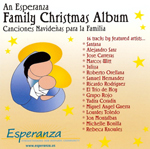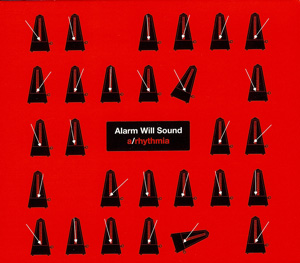
Alarm Will Sound A/RHYTHMIA Nonesuch 467708
- Performance:

- Sound:

Within three or four measures, the riot is in full swing. It’s as though Gershwin’s Rhapsody in Blue and Bernstein’s Trouble in Tahiti embrace under acid rain madness, while Frank Zappa and Bruce Springstein come sloshing through in quickstep fashion. You may not know just what’s happening, but you sure as hell want to dive in to find out.
Welcome to a/rhythmia, the sometimes alarming, sometimes droll new CD from New York’s 20-piece new music “band,†Alarm Will Sound.
With six composer-musicians among its members, it’s no surprise that one of the CD’s compositions is by ensemble co-founder and former rock musician Michael Gordon. That 11:23 minute work, Yo Shakespeare, is the longest on the program. Dating from 1992, it’s credited in the liner notes as Gordon’s breakthrough piece. Breakthrough into what, you may ask? As different rhythms play over and through each other, you can well imagine the Bard’s wig flying off, and Mistress Kate flying off the handle.
Also from 1992, five fabulous, fantastically titled 90-second excerpts from Animals and the Origins of Dance by Britain’s Benedect Mason unify the joy ride with hilarious discord. In the middle of all this, Ligeti senior’s wild “Movimento preciso e meccanico†from Chamber Concerto seems right at home. So does the most recently composed work, Dessert Search for Techno Baklava (2002) by David Wong (Mochipet), which seems to cross klezmer and Balkan rock with God knows what. Only Priscilla, Queen of the Desert knows for sure.
The extra surprises amidst an album of surprises are the quirky rhythms of two works from the late 14th and late 15th centuries. Composed respectively by Johannes Ciconia and Josquin des Prez, des Prez emerges respected if not unscathed. While they are in one sense from another time and place, where is that, the CD seems to ask. Is the answer in the two arrangements of studies for Player Piano by Conlon Nancarrow, the music of Harrison Birtwhistle, or Cfern by the English do Autechre? Do we need an answer for music that is so visceral that it’s hard to sit still?
This is totally engaging stuff. Wild, unpredictable, and filled with the life and color, its got acoustic instruments; electric keyboard, guitar, and bass; voice; and a truckload of percussion. Lots of winds – even panpipes – but not a single string. Tons of fun, but agitating to little puppies like five-month old Daisy, who barked at the barkingest passage until I gave her shelter under my chair.
Turn off the car alarm, then crank up the volume. On a scale of 1 to 10, this stuff is off the charts. The meek must definitely apply.
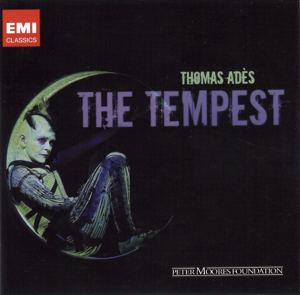
Thomas Adès The TempestEMI Classics 95234
- Performance:

- Recording:

Chromatic gales, emotion-churning dissonances, and vocal writing so torturous it makes you wonder if the all-star cast is composed of masochists: such is the score for composer Thomas Adès and librettist Meredith Oakes’ three-act opera, The Tempest. Based on Shakespeare’s eponymous play, it was commissioned by the Royal Opera Covent Garden, where it was premiered in February 2004 under the baton of then 32-year old Adès. The eerie opera has since been performed in Strasburg, Copenhagen, and Santa Fe, and is slated for Frankfurt in 2010 and the Met in 2012.
The cast for the two-CD set, recorded at the Royal Opera House in March 2007, includes many of the same singers who risked vocal ruin at the premiere. The list — Simon Keenlyside (Prospero), Ian Bostridge (Caliban), Kate Royal (Miranda), Toby Spence (Ferdinand), Philip Langridge (King of Naples), and Cynthia Sieden (Ariel) — reads like a who’s who of contemporary English vocalism.
How to describe this anything-but-easy-listening wild ride? It certainly has its share of arias, not least the Act III quintet, and the spirit Ariel’s amazing Act I coloratura tour de force, “Five fathoms deep.†As sung by Sieden, its words are impossible to understand without consulting the libretto. Sieden, who often sounds like a ridiculously high-pitched Florence Foster Jenkins who somehow manages to sing on key, squeaks in ways that make me wonder what she sounded like before she assumed the role. One thing is certain: Joan Sutherland would never have attempted such a part. Even the daring Beverly Sills, who risked singing the original torturous version of Zerbinetta’s aria from Strauss’ Ariadne auf Naxos, might have preferred sky diving off the Empire State Building to tackling this score.
No one is flattered by the writing’s wild leaps, save for the pure-voiced Spence. But that is not the point. Adès seems determined to portray the outer tempest as a projection of inner torment, and struggle is the order of the day. We listeners may initially struggle as well, but once you get the hang of what Adès is doing, his insights into character sing with eloquence. Assigning the roles of the drunken scum, Stefano (Stephen Richardson) and Trinculo (David Cordier), to a deep bass and hooting countertenor, is a powerful way to illustrate the yang and yin of treachery.
Perhaps the singers would have sounded better if the recording quality were even average. A hint of high frequency squeal halfway through the opera, and lots of background noise when mikes are turned up for the Royal Opera Chorus, suggests that the engineers finagled royally to make the recording acceptable.
Thankfully, the music’s emotional impact survives a washed out color palette. Perhaps if the planet were in a less dire state, Adès’ music would sound more like Puccini’s. But The Tempest is far more about what we’ve become in the early 21st century. As Shakespeare and Adès’ music suggest, only the redemptive power of love offers hope for transcendence of the tempest we’re in.
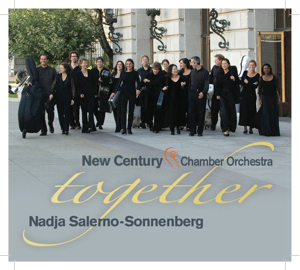
New Century Chamber Orchestra TogetherNSS 8
- Performance:

- Sonics:

Violinist Nadja Salerno-Sonnenberg, now Music Director and concertmaster of the Bay Area’s New Century Chamber Orchestra (NCCO), is prized for her bracing and authoritative playing. Her artistry, and the heart-warming camaraderie she generates with her first-rate colleagues, help insure that Together, the first CD from the ensemble on Salerno-Sonnenberg’s NSS Music label, is a joy from start to finish. Wonderfully recorded at Skywalker Studios, the close-miked blend brings to the fore all the color and nuance of these superb artists.
This is all for the best, because the repertoire on the CD is all about color, passion, and driving energy. The recording’s centerpiece, Leonid Desyatnikov’s orchestral arrangement of Astor Piazzolla’s The Four Seasons of Buenos Aires, is a stunner. (Although Piazzolla never intended to arrange the four independent pieces into a single suite, the marriage works wonderfully).
The opening movement, Primavera Portena, begins with savage intensity. Salerno-Sonnenberg bites into the strings as a lioness might her kill. In this case, however, the music lives on, vibrant and urgent. There’s a dark, almost dangerous sensuality stalking through the four movements, beckoning, compelling, ultimately seducing with its passion. This is not to say that there is no room for soulful yearning, as heard in the middle of the third movement, Invierno Porteno, but its judiciously judged sentimentality never becomes maudlin or self-absorbed. Very different than the recently issued performance by Trio Solisti, NCCO’s rendition of The Four Seasons of Buenos Aires immediately establishes them as a world-class ensemble.
It’s good to have a recording of resident composer Clarice Assad’s fine Impressions: Suite for Chamber Orchestra. Its opening theme is quite inviting, allowing more room to breathe than Piazzolla’s full-throttle assault. After the captivating second movement’s Danca Brasileira, with its echoes of Assad’s homeland, the middle movement’s lovely Slow Waltz contrasts with is grace. There’s lots of zippy energy in the challenging fourth movement Perpetual Motion, which Assad wrote to showcase what she calls in the liner notes the NCCO’s “flawless proficiency and impeccable artistry.†I couldn’t agree more.
After Béla Bartók’s familiar Romanian Folk Dances, in which Salerno-Sonnenberg cedes two of her solos to cellist Susan Babini and violist Anna Kruger, the concerts ends with a delightful “encoreâ€, Dave Rimelis’ supremely dreamy arrangement of the Gershwin’s “Bess, You Is My Woman Now†from Porgy & Bess. It may not capture the drama of the opera as a whole, but it’s irresistible. For anyone who thinks Salerno-Sonnenberg can only slash and burn, the sheer loveliness of her Gershwin playing declares otherwise. It’s a wonderful bon-bon end to a marvelous CD that should help propel the NCCO into the national spotlight.
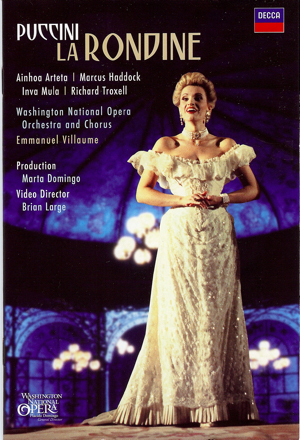
Puccini: La Rondine Washington National OperaDecca DVD 001304609
As this DVD unexpectedly reveals, most productions of Puccini’s much-misunderstood opera, La Rondine, are not the final word on this masterpiece. For that we must turn to the scholarship of Marta Domingo, and Decca’s DVD her radically revised version of the opera for Washington National Opera (WNO).
In her commentary on WNO’s 1998 production, Domingo notes that Puccini “was never quite satisfied with the result of his work.†Because he was especially unhappy with Adami’s libretto, the composer ultimately created three versions of La Rondine with two different endings.
Domingo’s revised performing version includes a first act aria for Ruggero, initially published in Puccini’s 1920 German score. She also has added “new†first and second act duets between lovebirds Magda and Rambaldo, created by Puccini for his second version, that clarify their relationship, and whose words insert perfectly into orchestral passages that were without vocal lines in the first version. Most important are a third act duet between the lovers, for which Lorenzo Ferrero has written new orchestration to replace music thought destroyed during World War II, and a very different denouement.
Working with new music that adds dramatic depth to characters and relationships, Domingo opted for Puccini’s seldom-heard alternate ending to the opera. Instead of having Magda leave the love of her life, Ruggero, who despairs as Magda sadly flies back to her caged life as Rambaldo’s mistress, Magda walks into the sea and commits suicide after Ruggero rejects her. So much for criticism that Puccini was incapable of writing anything more than a wishy-washy operetta that lacked a dramatic climax.
For those unprepared for the new ending, Domingo’s production and direction, as well as Emmanuel Villaume’s conducting, may initially register as disappointments. Gone is much of the lightness and gaiety that San Francisco experienced between our Magda and Ruggero, Angela Gheorghiu and Misha Didyk, and Lisette and Prunier, Anna Christy and Gerard Powers. Everything seems slower, at times drowning under a surfeit of romanticism. The production’s nadir, when a silhouetted violinist ridiculously hams it up as couples dance in the second act, can seem insufferable. Then, when bubbles burst and dreams dissolve into despair in the final act, romantic excess suddenly reveals itself as a set-up for the tragedy to come.
What is anything but tragic is the superb signing. Soprano Ainhoa Arteta’s Magda may not be as physically free and hyperactive as Gheorghiu’s – Domingo gives everyone far too many stock gestures – but her beauty and softly floated, radiant high notes are a constant pleasure. Arteta’s big aria, “Chi il bel sogno di Doretta?†is a triumph. The same is true of tenor Marcus Haddock’s ringing, vocally exceptional Ruggero, though not of his little lost-boy persona. It initially seems strange to hear Ruggero’s first act arias and subsequent duets sounding like reprises of “E lucevan le stele†(Tosca) and the love scene from Tosca and Butterfly, but once the tragedy becomes clear, it all makes sense.
Soprano Inva Mula, who recently appeared here in L’Elisir d’Amore, cannot approach Anna Christy’s endearing lightness, but she sings quite well. In keeping with opera’s tragic ending, Richard Troxell is a far weightier Prunier, and William Parcher a much uglier Rambaldo. I’d love to see what the same cast would do in the updated, 1920s production we saw here, especially with Ion Marin or Nicola Luisotti in the pit. But Domingo’s additions and revisions create an entirely new La Rondine, one that will lead to revised and, dare I say far more positive assessments of the work.

André Previn A CelebrationDG 4778114
- Performance:

- Recording:

To celebrate the 80th birthday of André Previn, Deutsche Grammophon has released a six CD of some of his recordings for the DG and Decca labels. Chosen by Previn, the recordings highlight his accomplishments as a conductor and composer of classical instrumental and vocal works.
Of everything in the set, which limits itself to music composed in the 20th and 21st centuries, my hands down favorite is Previn’s marvelous rendition of Richard Strauss’ Orchestral Suite from his opera, Der Rosenkavalier. Featuring the Vienna Philharmonic at its lushest, idiomatic best, the 1992 recording’s vivid colors and huge soundstage reap the benefits of DG’s “4D†recording process. Everyone sounds like they’re on top of the world, waltzing with abandon, glowing with romantic warmth, and having a bumptious time at the finale. Complemented by Strauss’ overly domesticated Symphonia Domestica, this is a disc to cherish.
How you feel about Previn the composer will determine your reaction to the inclusion of six of his complete or excerpted works. Certainly you will want to hear the 2007 world premiere live recording of Previn’s Double Concerto for Violin, Contrabass and Orchestra. Performed by the Boston Symphony Orchestra, with Previn at the helm, its violinist is none other than Previn’s fifth and perhaps final ex-wife, Anne-Sophie Mutter. Roman Patkoló performs on double bass.
In the Double Concerto, you will undoubtedly hear echoes of Previn’s career as a film composer, and the influence of his fellow German-Jewish émigré to Los Angeles, Erich Wolfgang Korngold. (Korngold’s Violin Concerto, performed by Mutter, and his Symphony in F sharp, both with the London Symphony Orchestra, fill the fourth CD of the set). In the Double Concerto’s second movement interlude, you’ll briefly hear what sound like double bass jazz riffs, a reflection of Previn’s long history as a jazz pianist. After the slow, somewhat touching Slowly movement, you may hear echoes of Bernstein West Side Story in the spirited final Allegro.
There’s lots more energetic movement in Previn’s Piano Concerto, recorded 20 years ago with Vladimir Ashkenazy and the Royal Philharmonic Orchestra. But segue into the generous CDs final offering, Prokofiev’s First Violin Concerto with Kyung Wha Chung and the London Symphony Orchestra, and you may be tempted to postulate whose music will still be played 50 years from now.
The first CD is devoted to complete recordings of Ravel’s ballet, Ma Mère l’Oye and one-act opera, L’Enfant et les Sortilèges. The fourth is reserved for Shostakovich’s Symphony No. 8 in C minor. Renée Fleming makes two appearances; her performance of Previn’s Three Dickinson Songs give us a taste of Previn the pianist, and her short excerpt from A Streetcar Named Desire reflects Previn’s ongoing career as an opera composer. While one of Previn’s favorite sopranos, Barbara Bonney, lacks representation, there’s still much to savor.
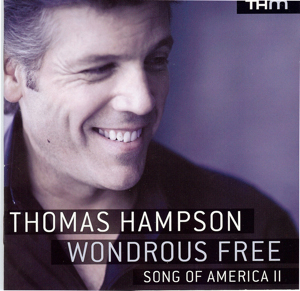
Thomas Hampson Wondrous Free – Songs of America IIThomas Hampson Media THM 5432
- Performance:

- Recording:

After several decades of championing American art song, baritone Thomas Hampson refuses to let the major label slowdown hold him back. Instead, he’s started the Thomas Hampson Media label, and launched a full-out multi-media American song assault.
Wondrous Free: Song of America II (THM 5432), his first recording on his label, showcases familiar and lesser-known American songs written between 1759 and 1982. The 22-song collection, which sidesteps Broadway, jazz, blues, and other popular idioms, is a fitting companion to EMI’s 2005 Hampson compilation, Song of America. But while that disc was drawn from three previous Hampson EMI releases, this CD seems comprised entirely of new selections. Everything has been well recorded in Berlin (with pianist Wolfram Rieger) and New York City (with Craig Rutenberg).
The recording’s release signaled the start of Hampson’s 12-recital Song of America (2009) tour. A collaboration with the Library of Congress, and designed to celebrate the 250th anniversary of the first American song, it receives full whammy treatment on Hampson’s website, http://www.hampsong.com. If you’re looking for a free iPhone Fan app, a downloadable InstantEncore recording of one of recitals, or an iTunes download of the CD – albeit in compromised sound that cannot convey the full beauty of Hampson’s special instrument – they’re just part of what’s available.
One thing becomes clear upon listening to the compilation: Americans sure are a sentimental lot. Robert Louis Stevenson’s poem, “Looking Glass River,†isn’t necessarily weighted with sentiment, but John Alden Carpenter’s setting (1909) certainly is. As an antidote, three songs by John Woods Duke, all set in 1948 to text by E.A. Robinson, talk of suicide, non-conformity, and the call from the other side. Carpenter’s “Richard Cory†packs quite the wallop, especially to listeners sensitive to homosexual undertones.
Some of the songs, notably “Shenandoah,†Stephen Foster’s “Hard Times,†Charles Ives’ marvelous “Memories,†Leonard Bernstein’s “A Simple Song,†Sidney Homer’s “General Booth Enters Into Heaven,†and Frances Hopkinson’s raison d’etre for the project, “My Days Have Been So Wondrous Free,†will be familiar to American song devotees. A foursome by Paul Bowles, which renders Tennessee Williams surprisingly sentimental, and others by Elinor Remick Warren, William Grant Still, Edward MacDowell, and Jay Unger (to text by Cleo Laine), are less frequently encountered.
To everything Hampson brings his signature mellifluous warmth and grace, often complemented by measured restraint. In comparison to live performances of five of the songs, recorded in Salzburg in 2001 and available in Orfeo’s two-disc Hampson set, I Hear America Singing, a bit of unsteadiness, slight tendency to wobble under pressure, and increased effort and spread at the top of the range are evident. But the beauty remains. Listen to the gorgeous floated falsetto at the conclusion of “Shenandoah,†and the supreme loveliness of the soft singing in “A Simple Song.†There is much here to treasure.
Portions of these reviews originally appeared on the website of San Francisco Classical Voice, http://www.sfcv.org.


